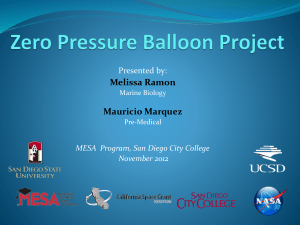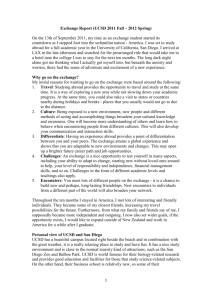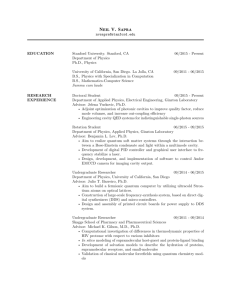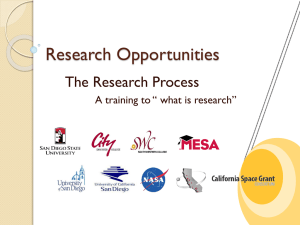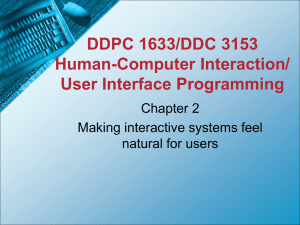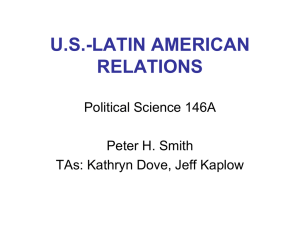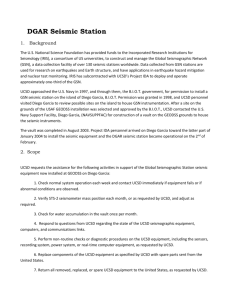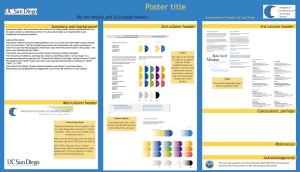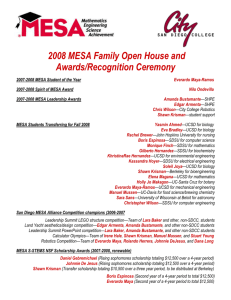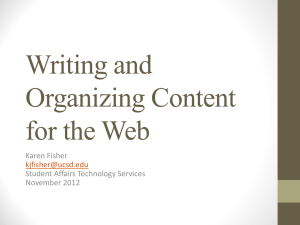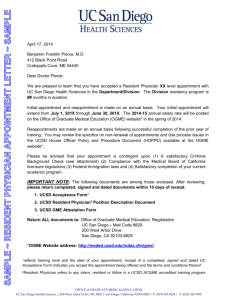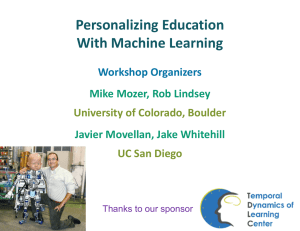Mixing and Flow Control in High Speed Combustors
advertisement
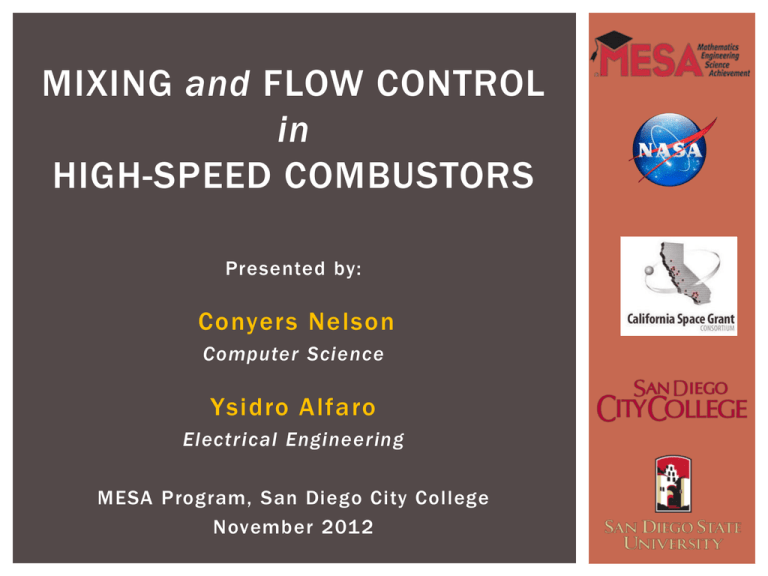
MIXING and FLOW CONTROL in HIGH-SPEED COMBUSTORS Presented by: Conyers Nelson Computer Science Ysidro Alfaro Electrical Engineering MESA Program, San Diego City College November 2012 BACKGROUND 1 week “train-the-trainer” academy for understanding “what is research?” Hosted at San Diego State University – July 2012 Led by 3 graduate research students 20 MESA student participants (10 each from City College and Southwestern College) Trained on research process Learned about available research opportunities Conducted 3-day “investigative shadow” in teams Funded by California Space Grant Consortium WHAT IS RESEARCH? RESEARCH ACTUALLY IS … Research is an investigation of an idea using a scientific, engineering, or research method. Scientific Method Engineering Method Research Method State your question Define the problem Identify and develop your topic Do background research Do background research Literature Survey Formulate your hypothesis Specify requirements Set goals Design experiment, establish procedure Create multiple solutions and choose the best one Theoretical Methods Test your hypothesis Build prototype Experimental Methods Analyze your results and draw conclusions Test and redesign as needed Data analysis and interpretation Communicate results Communicate results Communicate results 1 - IDENTIFY AND DEVELOP YOUR TOPIC Mix Flow Control in High Speed Combustors 2 - LITERATURE SURVEY Finding definition of concepts Mach and Froude numbers Mach number is the speed of velocity/speed of sound Froude number is the velocity of water/speed of the gravity of the wave Shallow water Theory: Analogy between shallow water and compressible gas Hydraulic jump Supercritical and Subcritical (Fast moving) (slow moving) HYDRAULIC JUMP Supercritical and Subcritical 3 - SET GOALS Discover how objects act in shallow water Find the correlation between Froude number and Mach number Help engineers who test wings Fuel efficiency of an aircraft The wing expansion The shape of the noise of the plane 4 - THEORETICAL METHOD Shallow water theory analogy: This is the analogy between shallow water and compressible gasses. Note: The water is an substitute for compressible gas By using water it saves time. Conducting this same experiment using a wind tunnel it would take ½ of a day. Water is cost ef ficient and take only 10 minutes. 3 GOVERNING EQUATIONS 1. Conservation Law of Mass-What size of mass goes in, the same sizes comes out. 𝑝1 𝑢 1 𝐴 1 = 𝑝 2 𝑢 2 𝐴 2 1. Conservation Law of Energy - Amount of energy that goes in, the same amount comes out. 𝑢 12 𝑢 22 ℎ1 + = ℎ2 + 2 2 1. Conservation Law of Momentum- Amount of momentum/force that goes in, the same amount goes out, 𝑝1 + 𝑝1 𝑢 2 1 = 𝑝2 + 𝑝2 𝑢 2 2 5 - EXPERIMENTAL METHOD http://www.youtube.com/watch?feature=player_embedded&v=3P3DzWjszFM MANUFACTURING Design Was created by Daniel Nelson, a graduate student at SDSU, studying fluid mechanics Get the pieces The projected was awarded a $1 ,200 grant to purchase materials. Build SOLIDWORKS Engineering Computer Program RESEARCH EXPERIENCE USING COOL MACHINES SAN DIEGO STATE UNIVERSIT Y (SDSU) Scholarships for Undergraduate Student Participation in Computational Science and Engineering Research Program Available to assist academically talented, financially needy students to explore opportunities for computational modeling and simulation research in science and engineering disciplines. Funded by National Science Foundation. SDSU (CONTINUED) Minority Access to Research Careers (MARC) The Minority Access to Research Career s (MARC) Honors Undergraduate Research Training Program was recently awarded to San Diego State Univer sity from the National Institutes of Health. Students who are selected as trainees can receive three -quar ter tuition and a monthly stipend of $ 913 Contact: Thelma Chavez SDSU (CONTINUED) Minority Biomedical Research Support (MBRS) Is an intensive undergraduate research training program which prepares students for direct entry into STEM Year-round financial assistance for your research development. Undergraduates are paid 15 hour s/week during the academic semester s, and up to 30 -40 hour s/week over the summer (depending on the budget) Year round research and academic mentoring Connection to graduate program and other research oppor tunities Contact: Michelle Lopez SDSU (CONTINUED) McNair Scholars Program In 1976, at the age of 26, he earned his Ph.D. in laser physics Ronald E. McNair was the second African American to fly in space . He was killed instantly when the Challenger exploded one minute, thirteen seconds after it was launched. Program is an innovative program that prepares talented students in the pursuit of doctoral study and careers in higher education. Contact: Veronica Bejar UNIVERSIT Y OF CALIFORNIA, SAN DIEGO (UCSD) AMGEN Scholars Program The program supports summer research for thirty undergraduates majoring in fields related to biotechnology, including: microbiology, bioengineering, biochemistry, neuroscience, and molecular genetics. Faculty Mentor Program The Faculty Mentor Program of fers research experience to all junior or seniors who have the desire to prepare for graduate or professional school. UCSD (CONTINUED) CAMP Science Program The UCSD California Louis Stokes Alliance for Minority Participation (CAMP) in Science, Engineering and Mathematics program provides support and advancement opportunities to ethnically underrepresented (African American, Mexican American, Latino, American Indian, Alaskan Native, or Native Pacific Islander) students who are seeking bachelor's degrees in chemistry, physics, cognitive science, biology, other sciences, mathematics, engineering and technology. Health & Medical Professions Preparation Program The UCSD Health and Medical Professions Preparation Program (HMP3) provides undergraduates with enriching experiences that will enhance their preparation for admission into professional school in the medical and other health professions. McNair Program The McNair Program provides low -income, first-generation college students, and students from groups underrepresented in graduate education, with effective preparation for doctoral study. UCSD (CONTINUED) MARC Scholars Program The Minority Access to Research Careers (MARC) Program is designed to train and prepare highly qualified underrepresented minority undergraduate students in the biosciences for entry into graduate school. Summer Research Program The UCSD Summer Research Program is an eight -week, fulltime research experience for undergraduates. UCSD Undergraduate Research Conference Held each May, the UCSD Annual Undergraduate Research Conference recognizes outstanding scholarly work produced by UCSD undergraduates. UCSD Undergraduate Research Scholarship All UCSD undergraduates in any major are eligible to apply. UNIVERSIT Y OF SAN DIEGO (USD) Summer Undergraduate Research Experience (SURE) provides funds to USD undergraduates to conduct summer research with a USD faculty mentor. Pre-Undergraduate Research Experience (PURE) offers summer research opportunities to San Diego high school students who will begin classes at USD in the fall and who may be the first in their families to pursue a college education. Honors Program offers a four-year interdisciplinary curriculum integrated with a student's major and engages the students in sustained independent work through original research projects as a focus of a senior independent study project. USD (CONTINUED) Community Ser vice-Learning offers course-based service-learning courses that incorporate community partnerships which can also include research and internship opportunities. McNair Scholars are partnered with faculty mentors in their discipline, formulate a research plan, and receive stipends to support their research projects. Hayes Scholarship/Fellowship provides funding to support research in the sciences. Independent study allows students to conduct research on a topic of interest by enrolling in an independent study course. In addition, research can be conducted as part of an international study course PERSONAL REFLECTIONS AVAILABLE RESEARCH ACADEMY TRAINING MATERIALS Research Process (PowerPoint) The Craft of Research (Text) How to Give a Research Presentation (PowerPoint) Training Handout (PDF) Error Analysis (PDF) Tips for Charts and Graphs (PDF) Presentation Rubric (PDF) Did you ask a good question today?" (PDF) For more information, visit MESA Program website: www.sdcity.edu/mesa (see “Announcements”) ACKNOWLEDGEMENTS QUESTIONS?
